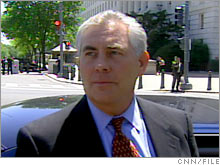ExxonMobil: Profits and discontentCritics say the oil giant is arrogant and irresponsible. Fortune's Marc Gunther looks at what the company will face at its annual shareholder meeting.NEW YORK (Fortune) -- ExxonMobil's stock is up by 35 percent in the last year. The oil giant made $39.5 billion in profits in 2006, tops in the Fortune 500. But don't expect a roomful of smiling faces at Exxon's annual shareholder meeting tomorrow. Instead, Greenpeace, gay-rights groups, critics of bloated CEO pay, religious shareholders and some of the nation's biggest public pension funds will assail the company for its lack of responsibility. They've filed a dozen shareholder resolutions on environmental, governance and social issues.
Rarely has there been such a stark disconnect between a company's outstanding financial performance and its not-so-stellar reputation as a corporate citizen. While other companies have become more "green," more gay-friendly and more willing to give stronger voice to shareholders, ExxonMobil (Charts, Fortune 500) continues to go its own way. Like his predecessor, Lee Raymond, chief executive Rex Tillerson seems disinclined to bow to today's conventional wisdom about how big corporations are supposed to behave. Why does ExxonMobil draw so much flak? Partly it's a matter of size and style. As the world's largest publicly traded oil company, ExxonMobil is a big target and it has done little, until recently, to engage with its critics. "It is a closed company," complains Robert A.G. Monks, a veteran shareholder advocate, whose family trust owns 100,000 shares of Exxon, worth about $8 million. "It is a company that listens only to itself." Last week, the California state teachers retirement fund, the state treasurers of a half dozen states, labor union pension funds and socially-responsible mutual funds said they would withhold their votes for an Exxon director, Michael Boskin, because he wouldn't meet with them. Boskin, a Stanford economics professor, chairs the board's public issues committee. He didn't respond to an e-mail seeking comment, but a company spokesman said Boskin communicates regularly with shareholders and that he helped arrange a day-long meeting for institutional investors with top ExxonMobil officials. The investors say they want access to the directors, as well. Speaking on a conference call, California's state controller, John Chiang, said of Boskin: "Your failure and unwillingness to communicate with your shareholders speaks volumes about your corporate governance policies." But the shareholder discontent is about substantive issues, too. The most prominent is climate change. General Electric (Charts, Fortune 500), Wal-Mart (Charts, Fortune 500), DuPont (Charts, Fortune 500) and oil companies Conoco-Phillips and BP (Charts) have called for strong federal regulation of greenhouse gas emissions. They accept the scientific consensus that global warming is a threat, that it's caused by man-made activity and that forceful remedies are required. ExxonMobil won't go that far. In its corporate responsibility report issued last week, the company says: "Because the risk to society and ecosystems from rising greenhouse gas emissions could prove to be significant, strategies that address the risk need to be developed and implemented." It goes out to lay out a set of principles that it believes make sense in addressing climate change. You can read more here. But the company has upset some environmentalists by providing financial backing (albeit small amounts) for groups that challenge the conventional wisdom on climate change. The Heartland Institute, a free-market think tank, publishes a newsletter called Environment and Climate News. Sample headlines: "Fears of Melting Polar Ice Are Discredited," "Record April Freeze Hits U.S." (!), "Scientists Urge Gore to Cool His Global Warming Rhetoric," "When Will We Tire of the Fear Mongers?" ExxonMobil gave $115,000 to the Heartland Institute in 2006. Another group on Exxon's support list is the George C. Marshall Institute. The climate change page on its Web site displays such headlines as "Storm Guru: Oceans, Not CO2, Cause Global Warming," and "Earth's Climate is Seesawing, According to Climate Reseachers." The institute got $85,000 last year from ExxonMobil. Gantt Walton, an ExxonMobil spokesman, said it's unfair to call these groups "climate deniers," as Greenpeace did, and that, in any case, they don't speak for ExxonMobil, which supports a broad range of public policy groups. Another Exxon spokesman told me by e-mail: "Groups like the Marshall Institute discussing credible reports from academics and climatologists are legitimate and important components in public policy development." Make up your own mind by visiting Marshall or Heartland. On governance issues, ExxonMobil opposes Monks' resolution that asks the company to separate the jobs of chairman and CEO. It opposes a proposal from Lucian Bebchuk, a Harvard Law school professor and prominent critic of excessive CEO pay, asking the company to give more power to its independent directors to approve executive compensation. It doesn't want to give shareholders a vote on executive comp, either. ExxonMobil also opposes a resolution asking the company to adopt in writing a non-discrimination policy against gays and lesbians. More than 80 percent of Fortune 500 companies (and 98 of the biggest 100) have done so. While Exxon says it opposes any form of discrimination, you have to wonder why the company won't put its position in writing, and what kind of signal that sends to gay or lesbian employees or prospective employees. All of these resolutions argue, in essence, that ExxonMobil has been too slow to adjust to a changing world. The dissident shareholders say the company and its shareholders will suffer if ExxonMobil does not prepare for an energy future that is less dependent on fossil fuels. They say the company will pay a price if it ignores social concerns about rising CEO pay. They say the company needs to reach out to diverse groups of employees, including gays. None of these arguments are new, and ExxonMobil has done just fine up to now by going its own way. That's probably why the company remains resistant to change. |
|

